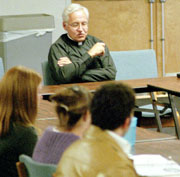The Rev. Bernard P. Knoth, S.J., was absent from a press conference outside his former office Tuesday afternoon that confirmed his resignation as university president.
Knoth left town sometime this week for Chicago to deal with an allegation of sexual misconduct stemming from 1986. In an open letter to students and faculty, he denied the accusation.
He resigned after an eight-year term that began in August 1995.
The Rev. William J. Byron, S.J., will serve as interim president until a permanent president can be found.
The complaint was filed by a former student of Brebeuf Jesuit Preparatory School in Indianapolis, Ind., according to George Kearney, director of publication for the Chicago Province of the Society of Jesus. The incident is reported to have happened in 1986 at the co-ed school. Knoth was principal there at the time.
Authorities would not divulge the complaintant’s age or sex, although the statute of limitations for reporting sexual misconduct runs out in Indiana when the victim turns 31. As of press time Wednesday night, no civil or criminal charges had been filed against Knoth in an Indianapolis court.
The allegation went through the Jesuits’ Chicago Provincial Review Board, which dealt with the preliminary investigation and found the alleged victim’s claim to be credible. The Chicago Province then received the review board’s decision and accepted its judgment.
The 2002 Charter for the Protection of Children and Young People was passed in Dallas last year as a measure to protect children in the care of the Catholic clergy. Chicago’s Provincial Superior removed Knoth from active ministry to comply with that charter, which was the result of a nationwide sex abuse scandal in the Catholic Church. Both the charter and the Norms of the United States Conference of Catholic Bishops outline that when a complaint against a member of the clergy is deemed credible, the clergy member must be removed from active ministry if the alleged incident involves a minor.
Following his removal from active ministry, Knoth was forced to resign because of Loyola’s requirement that its president must be a priest in good standing. He also requested a leave of absence from the Society of Jesus, which is not a stipulation of the Dallas charter.
Donna Fraiche, chairwoman of Loyola’s Board of Trustees, and Byron learned of Knoth’s pending resignation more than a week ago.
An anonymous tip reached The Maroon’s news editor Monday morning, but an official statement did not come out until Tuesday morning, when Fraiche summoned the members of the board for an emergency meeting and press conference. Board members would not comment on whether Knoth attended this meeting.
“I did not hear any rumors,” said Angela Haddad, communications senior. “We are all in a state of shock.”
The board reviewed and accepted Knoth’s letter of resignation and immediately appointed Byron as the interim president of Loyola.
He flew in from Baltimore to accept his new position and was present at Tuesday’s press conference.
Byron was Loyola’s dean of Arts and Sciences from 1973 to 1975.
He served as president of the University of Scranton from 1975 to 1982 and of Catholic University of America in Washington, D.C., from 1982 to 1992.
He had been working as a research professor at the Sellinger School of Business at Loyola College in Maryland.
“I have full faith in Byron to carry on the excellent university we have here,” Haddad said Tuesday afternoon.
Word of Knoth’s resignation didn’t reach the most of Loyola until around noon Tuesday, when the Department of Public Affairs sent out a campus e-mail and distrubuted press release packets.
Fraiche introduced the new interim president at the press conference outside the Office of the President in Marquette Hall.
Byron spoke for most of the press conference but said he was not aware of the nature of the allegations against Knoth.
Upon his arrival at Loyola in 1995, Knoth saw a need for vast improvement on the appearance of the university.
In the next few years, a new library, garage and dormitory were built, and Biever Hall was renovated.
Knoth had more plans that would improve the physical appearance of the school, such as remodeling Monroe Hall and renovating Cabra Hall, and Byron said that there’s no reason to say those projects will be dropped.
Knoth also accomplished unprecedented feats in the fundraising area. Loyola experienced its first $50 million capital campaign, which went toward the state-of-the-art library, student scholarships and faculty research projects.
Through his term, Knoth secured 60 endowed scholarships for hundreds of students, eight endowed chairs and 39 endowed professorships.
The student body increased in enrollment and diversity.
Loyola’s incoming freshman class almost consistently outstripped its predecessor in size and test scores during many of Knoth’s years as president.
Many students received Rhodes, British Marshall and Fulbright Scholarships during Knoth’s tenure at Loyola. U.S.A. Today and Glamour both featured Loyola in recent issues.
In his personal statement, Knoth expressed gratitude toward his brother Jesuits, alumni, the City of New Orleans, and Loyola and its accomplishments, the faculty, staff and students.
“It has been my honor to serve them,” he wrote in an official statement made public at noon Tuesday.
Knoth was unavailable for comment.

Bernard Knoth, S.J. (Photo Courtesy of Loyola University)







